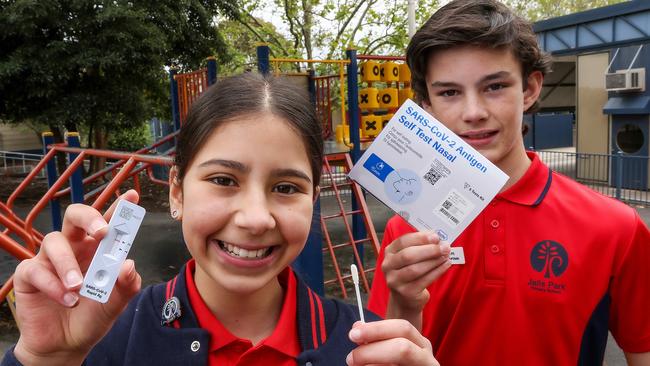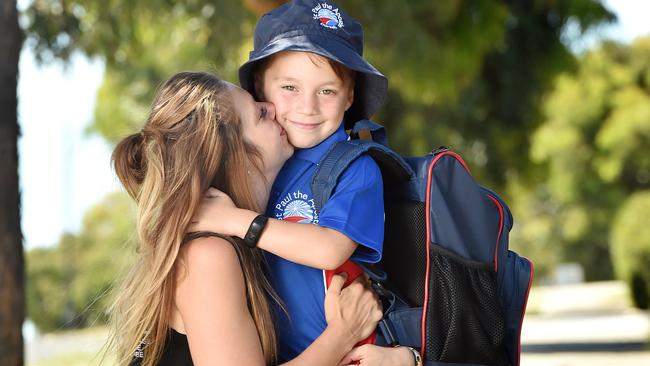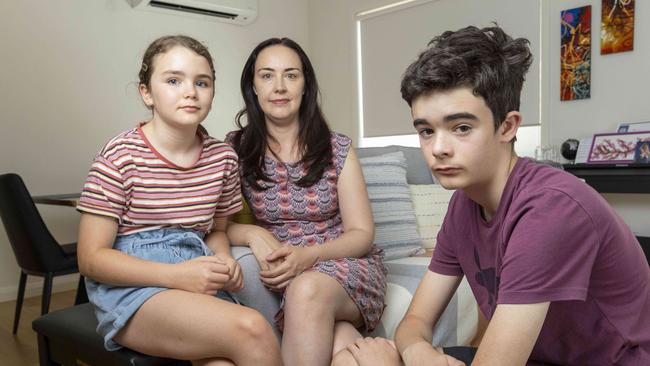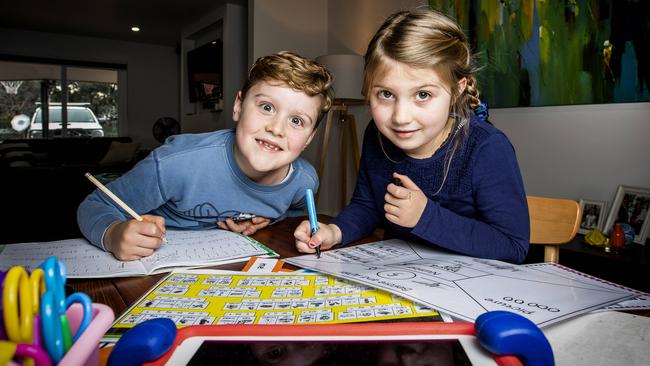Students to take two rapid antigen tests a week in back-to-school plan
Victorian children will be encouraged to take rapid antigen tests every week as part of a sweeping surveillance-testing regime proposed by the state government.

Victoria
Don't miss out on the headlines from Victoria. Followed categories will be added to My News.
Victorian children will be encouraged to take two rapid antigen tests every week under the state government’s plan to ensure schools can stay open safely amid the Omicron wave.
The government is set to provide the RATs to schools to distribute to families as part of a sweeping surveillance-testing regime.
The scheme, devised by Victoria in partnership with NSW, is expected to recommend that each student completes two tests a week.
Government sources said this was unlikely to be a strict requirement of attendance.
It is understood the testing recommendation may differ depending on the vaccination status of students and for those at higher risk of contracting and suffering from Covid.
Surveillance testing is seen as a key factor in an agreement to ensure students can start the school year on time, with national cabinet set to further discuss a national set of guidelines on Thursday.
Epidemiologists say rapid tests, combined with face masks and strong isolation protocols for sick children, should be enough to prevent widespread infections when schools return.
Omicron cases are predicted to peak by early February, which will make early detection of cases vital to prevent outbreaks.

Prior to the Omicron wave, school outbreaks meant children aged five to 11 made up more than a third of reported Covid cases in December.
As the school holidays began and infections surged among other age groups, this figure dropped to 4 per cent.
University of Sydney infectious diseases paediatrician Professor Robert Booy said outbreaks would occur even if term one was pushed back.
“If we delay school opening for two weeks, we will still have outbreaks when we open up again,” Prof Booy said.
“It may actually prolong and enlarge the outbreak by delaying. (Omicron) is going through the community at a very fast rate and does not affect schoolchildren severely. In fact, most children have symptoms of a cold and nothing more.”
Prof Booy said fewer disruptions to education would be better for children in the long run.
“Most kids won’t be infectious so it’s best to get them to school so they get social, a good education, improved mental health, better job prospects and longer lives,” he said.

Deakin University epidemiology chair Prof Catherine Bennett agreed school should this term return as planned, with face masks a simple protective measure.
“Indoor masks are a good idea while community incidence is high,” Prof Bennett said.
“This won’t always apply and will vary by area and so should be reviewed regularly as it can be difficult to maintain adherence especially in younger schoolchildren.”
University of South Australia Professor Adrian Esterman said schools could continue to remain open if teachers were triple-vaxxed, students had high vaccination rates, classrooms were well ventilated and schools introduced a ‘test to stay’ policy for students.
Prof Booy said NSW’s model of testing schoolchildren twice-weekly was effective and useful.
“When you have a proven outbreak, you can do a daily RAT in order for the child to be attending,” he said.

RATS ‘CRITICAL’ TO REOPENING
Education Minister James Merlino confirmed on Tuesday rapid testing would be a “critical component” of the back-to-school plan.
“RATs will be a critical feature of the back-to-school plan,” he said.
“In terms of exactly how that will work I will announce in the not too distant future.”
He said there would be time for schools, staff and families to prepare for the new school year.
“We will have students back at school day one, term one in a very very safe environment.”
Mr Merlino said Covid-safe settings would include exemptions for critical workers, the use of masks, RATs and air purifiers, which he said were on track to hit the promised 51,000.
He said the state government was committed to face-to-face learning.
Calls are mounting for the return to in-person schooling to be pushed back.
School council president Dr Shane Huntington said it is critical schools offer both online and in-person options for at least the first four to six weeks of term one.
“We know that many Covid mitigation strategies work, but the issue is they’re not yet in place,” Dr Huntington said.
“Very few schools have the required ventilation for Covid safe teaching, which means a huge proportion of staff will be asked to teach outside in the Australian summer – we’re asking kids and teachers to sit and learn in 35C heat.”
He said returning to physical schooling a month later than planned would have a profoundly lesser effect on kids’ mental health than the inevitable disruption that would arise from returning too soon.
“Kids have just had two months of holidays, an extra month will not have a lasting effect on them – it’s not lockdown, so they can still play together outside of school hours, but transmission in schools will be monstrous,” he said.

“What does impact kids is extreme disruption and significant change.
“We can’t just send them off to school like nothing is wrong.”
In term four of 2021, there were several thousand cases in Victoria, a number that has swelled vastly to nearly 250,000 current active cases.
“Obviously we know how challenging online schooling is, especially for parents, but at least this way we can prepare for it,” Dr Huntington said.
“What we can’t prepare for is receiving a sudden call from your child’s school saying they need to be taken home immediately and kept home for seven days.”
He said despite the burden homeschooling presents, he would rather keep his children and extended family safe.
“We’re not hearing from any teachers or school staff in public discussions, yet they’re the ones shouldering this burden,” Dr Huntington said.
“They need a seat at the table, because theirs are the voices that matter right now.”
Originally published as Students to take two rapid antigen tests a week in back-to-school plan




